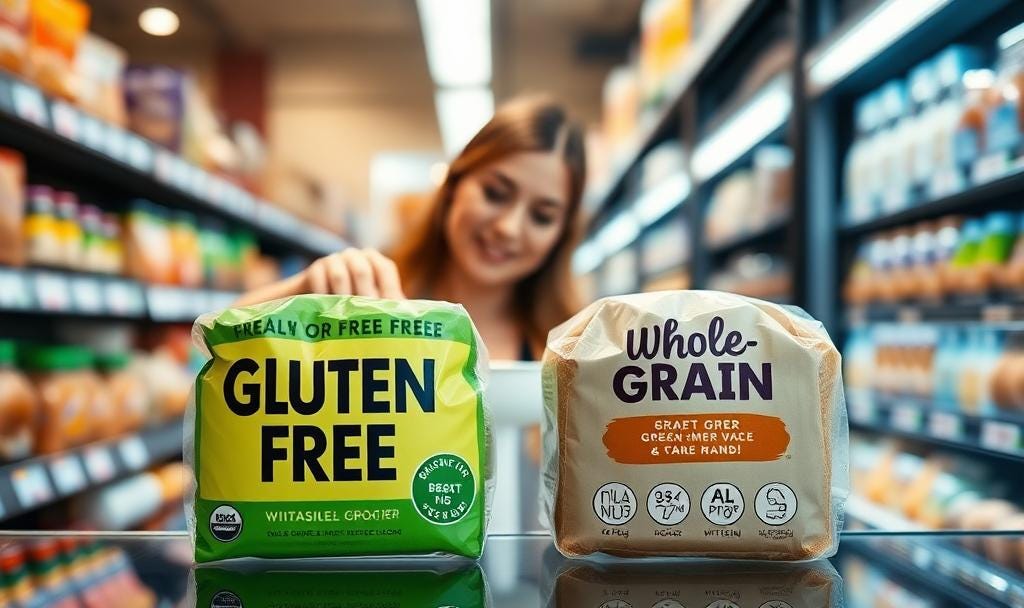Are Gluten-Free Foods Healthier? The Truth You Need to Know
Discover whether gluten-free foods are truly healthier or is it just clever marketing. Learn about their nutritional drawbacks and who actually needs them.
“Gluten-free” doesn’t always mean “better for you.” Here’s why.
Let's say you’re at the grocery store, staring at two loaves of bread. One proudly boasts “gluten-free” on its label, while the other is your standard whole-grain option. You instinctively reach for the gluten-free loaf, thinking it’s the healthier choice.
But is it really healthier?
Let’s uncover the truth behind the gluten-free craze and explore whether these foods are truly better for your health or is it just clever marketing.
What Is Gluten, and Why Do People Avoid It?
Gluten is a protein found in wheat, rye, and barley. For people with celiac disease, consuming even trace amounts of gluten can trigger an autoimmune response that damages their small intestine.
Others may avoid gluten due to non-celiac gluten sensitivity or wheat allergies, which can cause symptoms like bloating, fatigue, or headaches.
But here’s the catch: A growing number of people are avoiding gluten without any medical reason and believing it’s inherently healthier.
Is this assumption backed by science? Let’s find out.
The Nutritional Reality of Gluten-Free Foods
1. Lower in Protein and Fiber
A 2024 study revealed that gluten-free breads, pastas, and snacks often contain significantly less protein and fiber than their gluten-containing counterparts. Fiber is crucial for gut health and digestion, while protein supports muscle repair and satiety.
Who Should Care: Athletes or anyone looking to maintain muscle mass should think twice before swapping out gluten-containing foods.
2. Higher in Fats and Sugars
Many gluten-free products compensate for texture by adding more saturated fats or sugars. This can lead to higher calorie intake and potentially contribute to metabolic issues.
Example: Gluten-free biscuits often have more lipids (fats) than regular ones.
Who Should Care: Individuals managing weight or heart health should be cautious about these hidden ingredients.
3. More Expensive
Gluten-free foods are often marketed as premium products, making them significantly pricier and more expensive than regular options. While necessary for those with celiac disease, this cost can be prohibitive for others.
Who Should Care: Budget-conscious shoppers may find that the financial trade-off isn’t worth it unless medically required.
4. Potential Nutrient Deficiencies
Gluten-free diets can lack essential nutrients like iron, zinc, magnesium, and B vitamins if not carefully planned. These deficiencies are particularly concerning for children and pregnant women who need balanced nutrition for growth and development.
Are Gluten-Free Foods Ever Healthier?
For people with celiac disease or gluten sensitivity, avoiding gluten is non-negotiable as it prevents intestinal damage and alleviates symptoms like diarrhea or bloating.
Additionally, some individuals report feeling less bloated or fatigued on a gluten-free diet due to improved digestion.
However, for those without medical conditions, there’s little evidence suggesting that eliminating gluten provides significant health benefits.
How to Make Smarter Choices (Whether You Eat Gluten or Not)
Read Labels Carefully: Check for added sugars, fats, and sodium in packaged gluten-free foods.
Prioritize Whole Foods: Focus on naturally gluten-free options like fruits, vegetables, legumes, nuts, seeds, and lean proteins.
Balance Your Diet: If you’re avoiding gluten, ensure you’re getting enough fiber from sources like quinoa, chia seeds, or sweet potatoes.
Consult a Professional: Speak with a dietitian if you’re unsure whether a gluten-free diet is right for you.
Frequently Asked Questions About Gluten-Free Diets
Is it safe to go gluten-free without a diagnosis?
Yes, but you risk missing out on nutrients unless you plan your diet carefully. Always consult a doctor or dietitian first.
Can going gluten-free help with weight loss?
Not necessarily. Many gluten-free products are higher in fats and sugars, which could lead to weight gain instead of loss.
Is all rice-based food safe on a gluten-free diet?
While rice is naturally gluten-free, processed rice products may contain inorganic arsenic which is a toxin found in some soil environments.
Why Share This Article?
Think about it, how many people in your circle have jumped on the gluten-free bandwagon without fully understanding its implications?
By sharing this article, you’re empowering others with science-backed insights that could save them money and improve their health.
Let’s clear up misconceptions together. Share this article with your friends and family so they can make informed choices about their diets and avoid falling for marketing hype.





Another enlightening piece! Thank you for sharing.
This mirrors my thinking and research. All we have to do is flip over a gluten-free product and read the label to know that these are ultra-processed foods with many of the good parts removed.
The one point that I don't know about is missing out on nutrition if you skip wheat. I've been mostly wheat-free for years, and I don't think that I'm suffering at all nutritionally. However, I didn't replace bread with a different kind of bread. I eat non-bread and non-grain foods, and I'm doing quite fine. Grains are nice to have, but unnecessary.